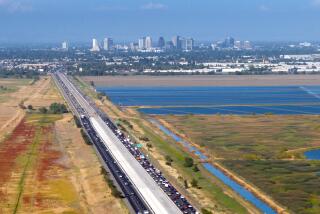Autobahn Remains Unregulated as Lawmakers Reject Latest Proposed Curbs : Germans in No Hurry to Pass Speed-Limit Law
- Share via
BONN, West Germany — A few hours after West Germany’s Parliament rejected a new attempt to place a speed limit on the nation’s famed autobahn , 85 cars and trucks sped like lemmings into a massive chain collision on the superhighway.
Five days later, a Cabinet minister clipping along at 100 m.p.h. was involved in a nasty accident on the autobahn, where speeding performance cars are sometimes mistaken for low-flying aircraft on air-defense radar screens.
The thrill of flooring a car on the no-speed-limit autobahn is the most visible symbol of personal freedom in a country notorious for its seemingly endless list of restrictions and taboos. But recurring tales of twisted metal and carnage in mass collisions, particularly during the long, foggy winters, have emboldened those who argue that limits are needed to save the Germans from themselves.
Other Nations Comply
All surrounding countries have speed limits, and they would apparently like to see the West Germans slow down as well.
But Chancellor Helmut Kohl’s government recently turned thumbs down on a European Communities recommendation for a 120-kilometer-per-hour speed limit--the equivalent of 74 m.p.h.--on the 5,219 miles of the autobahn. On the day of the 85-vehicle pileup east of Bonn, Kohl’s parliamentary majority was able to defeat another demand by the opposition Greens and Social Democrats to cap autobahn speed at 100 kilometers per hour, about 62 m.p.h.
The privilege of going as fast as one can on the autobahn remains a political sacred cow. It seems to tap a primal streak of aggression in the German character and enjoys unwavering protection from the car industry and powerful automobile clubs.
German car company officials argue that the no-holds-barred autobahn image is an essential ingredient in their export success. In Germany, one need not head for a race track to do with a car what foreigners only dream about.
German automobile manufacturers have grabbed an impressive share of the upscale car market with their reputation for quality, luxury, performance and, above all, speed. The BMW has become Japan’s biggest-selling imported car, and even the adverse dollar-mark rate has not killed big-ticket Mercedes demand among the U.S. motoring elite.
Safety Claims
The Germans insist that their roads are safe.
Although the autobahn network is only a small fraction of the country’s 307,500 miles of roads, it handles 27% of all traffic. The statistics show that accidents and fatalities are disproportionately low on the autobahns.
“The autobahns are the safest roads that exist,” said Bernd Bialleck, a Transport Ministry spokesman. “A speed limit by itself would not accomplish anything. It would have to be enforced.”
His ministry trots out statistics to show that the country’s motorists dutifully abide by the government’s recommended limit of 130 kilometers per hour--about 80 m.p.h.--and that the average driver travels only 70 m.p.h. on the autobahn.
Transportation Minister Juergen Warnke assured the Bundestag, or Parliament, during the recent debate that West Germans are not, as the environmentalist Greens contended, “a tribe of speeders.”
But Greens lawmaker Norbert Weiss charged that the government’s accident figures are misleading, and Social Democratic lawmaker Robert Antretter accused the government of “playing down” the problem.
The critics got new ammunition July 1 when Economics Minister Martin Bangemann had a close brush with death on the autobahn while racing at 100 m.p.h. in his official Mercedes to an appointment near Frankfurt. Bangemann’s car narrowly avoided a truck that suddenly moved into his lane, but a second Mercedes in the minister’s convoy hit the truck.
Photo Spread
Splashed across the front pages of the next day’s tabloids was the story of the enraged Cabinet minister chasing down the truck and shouting at the driver: “You are all murderers! You have no business in the passing lane!”
Three years ago, speed limit advocates blamed exhaust fumes for a blight that was killing the beloved German forests. But the Kohl government defused the issue by introducing unleaded gasoline and exhaust catalysts. It also conducted tests that showed that a speed limit would not make the air much cleaner.
Bumper stickers pleading for “maximum speed of 100 kilometers per hour for the forests’ sake” are still seen, but the environmental issue flickers low these days. More and more West Germans, however, are having second thoughts about whether it is really safe to gun their cars down the autobahn.
“I’ve concluded it’s just irresponsible to go more than 100 kilometers per hour,” said an editor in Hamburg. “I just let them pass me if they want. It doesn’t bother me.”
‘I’ve concluded it’s just irresponsible to go more than 100 kilometers per hour. I just let them pass me if they want. It doesn’t bother me.’
More to Read
Sign up for Essential California
The most important California stories and recommendations in your inbox every morning.
You may occasionally receive promotional content from the Los Angeles Times.













